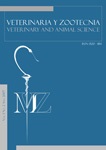Authors
Abstract
ABSTRACT: This is a representative sample of the ideas that support the “comparative anatomy”, an integral part of the curriculum thematic in Veterinary Medicine and Zootechnics, which also supports reflections of evolutionary biology. Theories of variations of living species have their origins in the foundation of Western knowledge, and the explanations about their evolution are found in different authors from different times. This is why this document passes through their most renowed writings and evolutionary concepts. Starting by setting out the proposals of the Greek who made contributions in this field, passing through characters who have made explanatory statements, to get to a link with Charles Darwin. For clarity it takes three stages: natural history, the step from natural history to evolutionary theory, and evolutionary biology. This Historic work helps to motivate the study of the origins of veterinary sciences.
Keywords
References
Aldrovandi, U. Monstrorum historia. Bolonia, 1647. p.663.
Aréchiga, C.V. El concepto de degeneración en Buffon. Ludus vitalis Journal of Philosophy of Life Sciences, v.4, n.6, p.55-74, 1996.
Aristóteles. Investigación sobre los animales. Madrid: Gredos, 1992. p.9-36.
Asimov, I. Grandes ideas de la Ciencia. Alianza Editorial Madrid 1996.
Bacon, F. Novum organum. México: Porrúa S.A., 1991. p.40-50. Buffon. Las épocas de la naturaleza. Madrid: Alianza Editorial, 1997. 429p.
________. Histoire naturelle des animaux. Obras completas. s.f. 16- iii, p. 27-28.
Cedric, G. La revolución científica anterior a 1830. Ludus vitalis Journal of Philosophy of Life Science, v.8, n.13, p.5-34.
Cuvier, G. Lecons d’anatomie compareé. 2ª ed. Paris: Cor et augm Crochard, 1846. 282p.
Dinnik, M.A. Historia de la filosofía. Tomo I. De la antigüedad a comienzos del siglo XIX. México: Grijalbo, 1968. p.71-73, 70-112, 119-121.
Drowin, J.M. Historia de las ciencias. De Linneo a Darwin. Madrid: Cátedra S.A., 1989. p.363-379.
Felip, C. Historia de la ciencia. Edad Moderna II. Barcelona: Planeta, 1990. p.69-103, 116-120, 121-127, 127-130.
Foucault, M. Las palabras y las cosas. Ed. Siglo XXI, 1968. p.151.
Geimonat, L. Historia de la filosofía y de la ciencia. Barcelona: Crítica, 1985. p.100, 102, 106, 107.
Gordon, S. Historia y filosofía de las ciencias. Barcelona: Ariel, 1995. p.530-534.
Hirschberger, J. Historia de la filosofía. Barcelona: Herder S.A., 1977. p.61-26.
Hull, L.W.H. Historia y filosofía de la ciencia. Barcelona: Ariel, 1989. p.35, 54-56, 66, 122, 123.
Jacob, F. La lógica de lo viviente. Una historia de la herencia. Barcelona: Tusquets, 1999. p.79-171, 145-146.
Kant, I. Crítica del juicio. México: Parra S.A., 1973.
Kant, I. Principios metafísicos de las ciencias naturales. Madrid: Alianza, 1989.
Kant, I. Crítica de la razón pura. Bogotá: Alfaguara, 1998.
Lamarck, J.B.M.A. Discours préliminaire sur la flore Françoise. La academie royale des sciences du 6 Février 1779. 119p.
Lamarck, J.B.M.A. Filosofía zoológica. París: Mateu, 1971. 296p.
Linneai, C. Philosophia botanica: in qua explicantur botanices fundamenta. Madrid: Aucta et emendate; Tornaci Nerviorum: E. Typis C. Casterman-Dieu, 1824. 471p.
Restrepo, O. Historia natural y ciencias agropecuarias. Naturalistas; la construcción de un orden natural. Bogotá: Tercer Mundo, 1993. p.27- 31.
Sarukhan, J. Las musas de Darwin. México: Fondo de Cultura Económica, 2000. p.31-34, 59-63.
Tournefort. Isagoge in rem herbariam, 1719. Trad. francesa en Becker-Toumefort, París, 1956. p.295.

 PDF (Español)
PDF (Español)
 FLIP
FLIP










